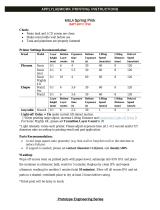
Bottom Lift Speed
(mm/min)
Note:
a. When the room temperature during printing is 18℃-24℃, change the settings as follows:
Bottom exposure time: (G217 settings) +15%
Normal exposure time: (G217 settings) +15%
Light-off Delay time: (G217 settings) +1s
It is recommended to heat the resin if the printing is still not successful.(The heating temperature
is 60-80℃, heating time is 10mins). And it is not recommended for printing at room temperature
lower than 18℃
b. The lifting of some printers can be divided into two stages. All the above settings for lifting
only for to the first stage. The lifting speed of the first stage is generally very slow, no need to
change
*The calculation of the above printing parameters is based on the experimental results of the
RESIONE laboratory and is for reference only
4. Cleaning and Post-curing
Cleaning: You can use ultrasonic or 3D printing special cleaning machine with the
ethanol(concentration≥95%), or IPA to clean for less than 2min. Please use compressed air to dry
the prints after cleaning it.
Post-curing: If you use a post-curing box with a power of 40W, our recommended post-curing
time is about 10mins (Adjust the post-curing time according to the power of the post-curing box,
the greater the power, the shorter the time).
Attentions:
a. Too long post-curing time will make the resin prints easy to warping, hard and brittle.
b. The resin prints will be fragile after post-curing. It is not recommended to apply force to the
prints immediately. Just need to wait for a while until the internal stress of the prints is completely
released.








